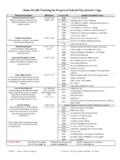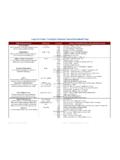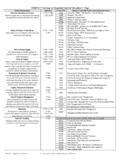Transcription of Train employees at orientation & ongoing on
1 Long Term Care: Training for Required Federal Education/F-Tags Updated Sept 2012 LTC Care2 Learn P= Inservice; All other numbers indicate a CE Course Federal Requirement Reference Course # Sample of Available Topics (visit website for more) Abuse & Neglect Train employees at orientation & ongoing on issues related to abuse prohibition practices. F 223, F 224 & F226 P1036 Abuse and Neglect of the Elderly - An Overview P1037A A Closer Look at Elder Abuse 1054 Abuse and Neglect of the Elderly P1225A Abuse of the Elderly on the Job: Don t Let it Be Me P1134 Failure to Thrive in Older Adults P1229AD Zero Tolerance: Abuse of Individuals w/Development Disabilities Resident Rights Educate staff on facility policies & procedures on advance directives and resident rights. F 150 F 156 1330 Advance Directives: Ethics and Management P1170 Boundaries in Caregiving P1014 Choices: A Gift We Owe Our Residents P1058 End of Life Care: Advance Directives P1013 Resident s Rights: The Right Thing to Do Infection Prevention & Control Educate employees at orientation and ongoing on standard precautions & infection control.
2 F 441 P1200 Bed Bug Infestations 1443AD Clostridium Difficile P1066 Handwashing: The Latest CDC Recommendations 1062 Infection Control Basics P1028 Infection Control Inservice 1350 Infection Control Planning in LTC P1194 MRSA: A Time for Action P1175 Prevention of Urinary Tract Infections in the Elderly P1152 Tuberculosis: The Basics Emergency Preparedness Train employees in emergency procedures on orientation and ongoing . F 518 1140 Bioterrorism for Nurses P1156 Disaster Preparedness: Bioterrorism, Terrorism & Nuclear Disaster P1155 Disaster Preparedness: Extreme Heat and Cold P1153 Disaster Preparedness: Hurricane Preparedness P1154 Disaster Preparedness: Severe Weather and Natural Disasters 1269 Disaster Preparedness: A Template for Preparation for LTC HIPAA Provide training on HIPAA policies & procedures at orientation & with change to policy/procedure.
3 45 CFR (b) 1183 The HIPAA Privacy Rule: Patient Services and Marketing 1045 HIPAA Privacy Standards P1035 HIPAA Privacy Standards for Everyone Exposure Prevention & Control OSHA requires orientation and annual training on bloodborne pathogens and exposure control. 29 CFR CPL (OSHA) CPL (OSHA) P1188 Back to Basics: OSHA Fit Testing for Particulate Respirators 1391 Bloodborne Pathogens P1075 Bloodborne Pathogens: OSHA Standard 1198 Hepatitis: The ABC s P1026 HIV and AIDS: An Inservice for Health Care Workers P1137 HIV and AIDS: Answering Your Questions 1068 HIV/AIDS: Prevention and Management of Occupational Exposure 1248 HIV/AIDS: Counseling, Testing, and Psychosocial Issues OSHA Right to Know Provide employees information & training on hazardous chemicals and health hazards on orientation and with introduction of new hazards.
4 29 CFR (h) P1033 Falls, Fire and Other Hazards P1059 Hazard Communication: MSDS and your Right to Know P1105 Hazardous Materials P1230AD Lockout/Tagout Basics and Electrical Safety P1165 OSHA: Confined Space P1191 OSHA: Prevention of Slips, Trips, and Falls Federal False Claims Act Educate employees & contracted staff on Federal False Claims Act upon orientation . Required for health care providers making/receiving annual Medicaid payments of 5 million dollars or more. False Claims Act (31 3279) Deficit Reduction Act 2005 1141 Compliance CEU P1166 Documentation for Nursing Assistants 1273 Documentation of Rehab Services for Medicare Reimbursement 1249 Documentation: Legal Aspects 1216 Documenting Nursing Assessment Data P1117 Introduction to Healthcare Compliance P1163 Fair Housing in Senior Care P1193 Red Flags Rule Compliance 1149 Regulation, Reimbursement, Quality and Ethics in a Competitive Long-Term Care Environment Restraints The resident has the right to be free from restraints.
5 F 221 / 222 1366 Avoiding the Use of Restraints 1392 Interviewing for MDS Resident Assessment 1393 Introduction to MDS 1395 MDS : Sections A through Z 1396 MDS and RUGS IV: What you Need to Know 1220 Restraint Prevention and Management 1367 Restraints, Seclusion, and the 1 Hour Evaluation Long Term Care: Training for Required Federal Education/F-Tags Updated Sept 2012 LTC Care2 Learn P= Inservice; All other numbers indicate a CE Course Federal Requirement Reference Course # Sample of Available Topics (visit website for more) Quality of Care Each resident must receive the necessary care and services to attain or maintain the highest practicable physical, mental and psychological well-being. F 309 * Care Basics Series (multiple programs) * End of Life Care Series (multiple programs) P1187 Age Specific Care for the Population We Serve 1452AD An Overview of the Aging Process 1161 Diabetes: Oral Medications Used to Treat People with Type 2 Diabetes P1074 Fluid Replacement: The Danger of Dehydration P1228AD How People Age 1172 Pain Assessment and Management P1173 Recognizing and Responding to Pain Pressure Ulcers The facility must ensure that the resident does not develop pressure sores unless the individual s clinical condition demonstrates that they were unavoidable.
6 F 314 P1176 Pressure Ulcer Risk Factors and Prevention Techniques 1274 Pressure Ulcer Risk Factors & Prevention Techniques: Every Square Inch 1365 Pressure Ulcers: Prevention, Care and Management P1060 Prevention of Pressure Ulcers-How you can help 1301 Wound Series: Pressure Ulcer Assessment, Interventions, and Prevention Restorative Nursing The facility is responsible for providing maintenance and restorative programs that will not only maintain but improve, as indicated by the resident s comprehensive assessment to achieve and maintain the highest practicable outcome. F 311 1403 Restorative Nursing Foundation 1406 Restorative Nursing: Dining and Feeding 1407 Restorative Nursing: Bowel and Bladder 1408 Restorative Nursing: Mobility 1409 Restorative Nursing: Range of Motion (ROM) 1410 Restorative Nursing: Activities of Daily Living P1211 Restorative Nursing for Nursing Assistants P1213 Restorative Nursing: Bowel and Bladder for Nursing Assistants P1214 Restorative Nursing: Dining and Feeding for Nursing Assistants P1215 Restorative Nursing: Mobility for Nursing Assistants P1216 Restorative Nursing: Range of Motion for Nursing Assistants P1217 Restorative Nursing.
7 Activities of Daily Living for Nursing Assistants Incontinence The resident who is incontinent of bladder receives appropriate treatment and services to prevent urinary tract infections and to restore as much normal bladder function as possible. F 315 P1151 Bowel and Bladder Care and Training 1143 Incontinence - Squeeze When you Sneeze 1364 Preventing Catheter-Associated Urinary Tract Infections in Indwelling Catheters P1175 Prevention of Urinary Tract Infections in the Elderly P1071 Urinary Catheter Care Accidents & Supervision Train employees on ensuring that the resident environment remains free from accident hazards as possible; and each resident receives adequate supervision. F 323 * Care Basics Series (multiple programs) P1114 Elopement: Prevention and Action P1033 Falls, Fire and Other Hazards P1105 Hazardous Materials 1363 Preventing Patient Falls: A Team Approach 1111 Risk Management in Long Term Care P1073 Safety in the Home Medication Errors The facility is responsible for ensuring that the place and residents are free of medication errors.
8 F 332 / 333 P1179 Admission, Transfer, and Discharge P1159 Medical Error Prevention and Safety for CNAs 1101 Medical Errors Prevention 1125 Medication Actions and Interactions CNA ongoing Education Each nurse aide must have no less than twelve hours of in-service education per year. F 497 Variety of Courses & Inservices available. Following is a sample: P1225 Abuse of the Elderly on the Job: Don t Let it Be Me P1049 Basic Clinical Skills * Care Basics Series P1011 Communicating with the Elderly P1086 Dementia Care: Understanding the Residents with Memory Problems P1228AD How People Age P1087 Managing Problem Behaviors Day-to-Day P1181 Patient Mobility: Transfer Skills * Inservice Series: * Care Basics (7 programs) * Dementia Care (8 programs) * Disaster Preparedness (4 programs) * End of Life (6 programs) * Hepatitis (4 programs) * Life Skills (14 programs)









